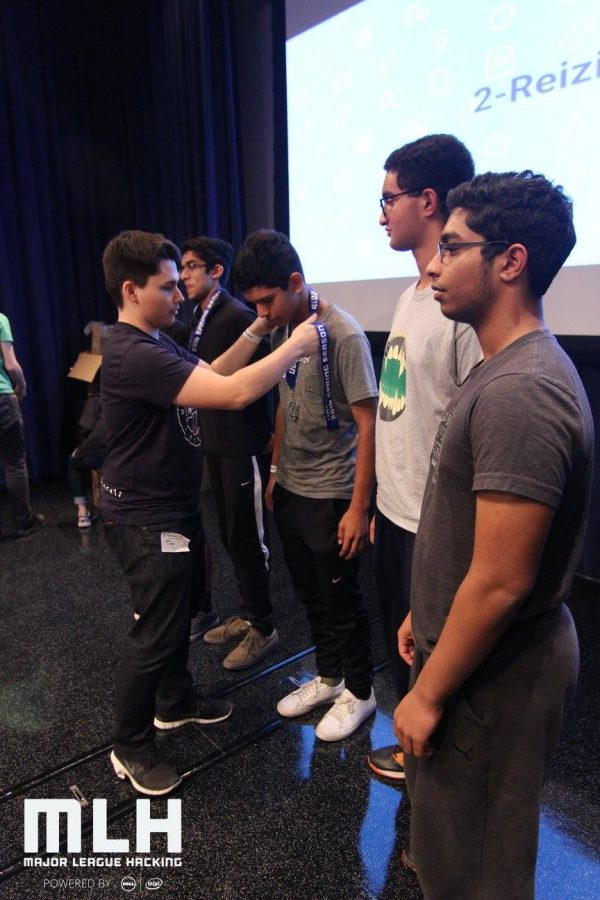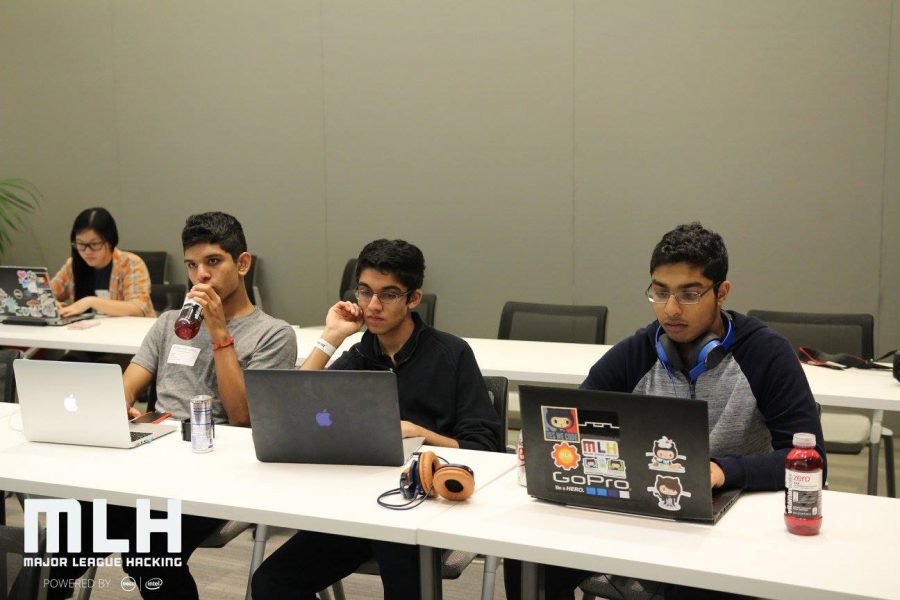Students participate in Hackathons
Courtesy of Major League Hacking
Kedar Gupta (11) receives an award for his participation at a Hackathon. Some Harker students interested in developing software attend Hackathons across the Bay Area.
May 5, 2016
Students crowd around computers with eyes glued to the screens. The sound of murmur and quiet whispers flows through the room, as ideas are developed even further when bounced off each teammate.
Hackathons, also known as hack days, hack fests or codefests, are events in which teams from various schools use limited time to develop software projects such as applications and websites.
Some students think of ideas for projects before the actual event, and they implement and develop them further during the hackathon. However, some choose to network and start ideas at the event rather than before it.
“We started thinking of ideas beforehand, but I know a lot of people that just go individually, and they meet new people and then think of an idea at the event,” hackathon attendee Kedar Gupta (11) said. “So, I created this app where you take a picture of your ingredients and it tells you what you can make. Since I’m always home alone and I don’t know what to cook, I was thinking how do I solve that problem?”
Hackathon proposals can incorporate student creativity to improve a certain aspect of a community.
“We did a copyright infringement thing; we [took] any music or audio file, and we compared it with a list of known songs,” hackathon participant Sumer Kohli (10) said. “You can train it to a song database like YouTube or something to identify if you’ve used any part of other songs in your video.”
Although Harker does not have an official club for hackathon participants, the majority of students that attend are also members of Programming club, according to computer science teacher Anu Datar.
“I don’t believe that any development that occurs in haste is essentially good; sometimes that means a quick thought process, analyzing and developing,” Datar said. “Hackathons [are] more like you start jumping into things and start developing, but sometimes, that developing does make you do intense thinking, which makes a big difference.”
Most hackathon participants attend as many as four or five a year, according to Kedar. Past hackathons in the Bay Area have been held at the Microsoft headquarters as well as high school campuses. Most hackathons target students at the collegiate level, decreasing the opportunities for high school students to attend.
Students who have experience building and programming at hackathons have found them worthwhile experiences.
“I really like the entire experience of going there and spending the day making something,” hackathon attendee Parth Pendurkar (11) said. “Then, when I’m done with it at the end, I have a finished product that I can look at.”
Students enjoy the teamwork element of the event as well.
“I definitely learn a lot, even from new teammates,” Kedar said. “Also, it’s nice to see how other people work, in stressful situations especially.”
The next hackathon for high school students is the Hackathon for Entrepreneurs 4.2, which will be held in San Francisco tomorrow from 10 a.m. to 10 p.m.
This piece was originally published in the pages of the Winged Post on May 4, 2016.


















![“[Building nerf blasters] became this outlet of creativity for me that hasn't been matched by anything else. The process [of] making a build complete to your desire is such a painstakingly difficult process, but I've had to learn from [the skills needed from] soldering to proper painting. There's so many different options for everything, if you think about it, it exists. The best part is [that] if it doesn't exist, you can build it yourself," Ishaan Parate said.](https://harkeraquila.com/wp-content/uploads/2022/08/DSC_8149-900x604.jpg)




![“When I came into high school, I was ready to be a follower. But DECA was a game changer for me. It helped me overcome my fear of public speaking, and it's played such a major role in who I've become today. To be able to successfully lead a chapter of 150 students, an officer team and be one of the upperclassmen I once really admired is something I'm [really] proud of,” Anvitha Tummala ('21) said.](https://harkeraquila.com/wp-content/uploads/2021/07/Screen-Shot-2021-07-25-at-9.50.05-AM-900x594.png)







![“I think getting up in the morning and having a sense of purpose [is exciting]. I think without a certain amount of drive, life is kind of obsolete and mundane, and I think having that every single day is what makes each day unique and kind of makes life exciting,” Neymika Jain (12) said.](https://harkeraquila.com/wp-content/uploads/2017/06/Screen-Shot-2017-06-03-at-4.54.16-PM.png)








![“My slogan is ‘slow feet, don’t eat, and I’m hungry.’ You need to run fast to get where you are–you aren't going to get those championships if you aren't fast,” Angel Cervantes (12) said. “I want to do well in school on my tests and in track and win championships for my team. I live by that, [and] I can do that anywhere: in the classroom or on the field.”](https://harkeraquila.com/wp-content/uploads/2018/06/DSC5146-900x601.jpg)
![“[Volleyball has] taught me how to fall correctly, and another thing it taught is that you don’t have to be the best at something to be good at it. If you just hit the ball in a smart way, then it still scores points and you’re good at it. You could be a background player and still make a much bigger impact on the team than you would think,” Anya Gert (’20) said.](https://harkeraquila.com/wp-content/uploads/2020/06/AnnaGert_JinTuan_HoHPhotoEdited-600x900.jpeg)

![“I'm not nearly there yet, but [my confidence has] definitely been getting better since I was pretty shy and timid coming into Harker my freshman year. I know that there's a lot of people that are really confident in what they do, and I really admire them. Everyone's so driven and that has really pushed me to kind of try to find my own place in high school and be more confident,” Alyssa Huang (’20) said.](https://harkeraquila.com/wp-content/uploads/2020/06/AlyssaHuang_EmilyChen_HoHPhoto-900x749.jpeg)







